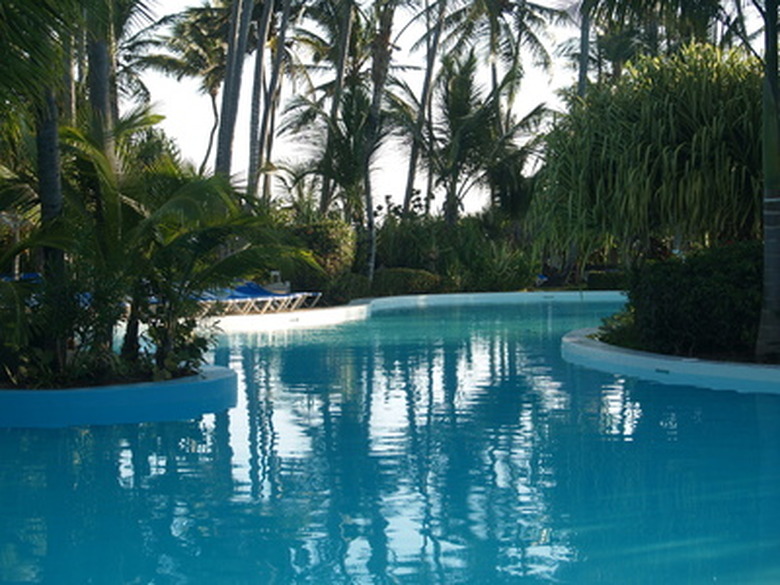The Best Trees For Swimming Pools
Privacy and shade are two important requirements that come to mind when considering trees for landscaping swimming pools. However, not all trees that provide privacy and shade are ideal for the areas near the pool. Trees that frequently shed and/or produce pollens require frequent maintenance, making them less preferable. Fortunately, you can choose some hassle-free tree varieties for pool landscaping.
Palm Tree
Palm trees are some of the most popular choices of trees for landscaping near swimming pools. Recommended for tropical or non-tropical landscaping, palm trees can grow up to 50 feet tall.
Native to North America, Queen Palm (Syagrus romanzoffiana) has single, ringed trunk that is smooth, straight and topped with a large canopy of feathery fronds. The fronds are dark green and have double rows of lanceolate-shaped leaflets that reach up to 18 or more inches long. The queen palm produces clustered flowers during summer as well as hanging ornamental, bright orange dates that ripen during the winter months. The flowers range in colors of white, cream and gray. Carefully pruning the stalks of queen palms before flowers and dates appear will prevent litters.
- Privacy and shade are two important requirements that come to mind when considering trees for landscaping swimming pools.
- Recommended for tropical or non-tropical landscaping, palm trees can grow up to 50 feet tall.
Hardy to zones 9B through 11, queen palm is moderately drought-tolerant and prefers full sun. It can tolerate various well-drained or occasionally wet types of soils. The roots are not invasive; however, planting near pools may pose a problem with the alkaline water. Regular preventive applications of manganese and/or iron will help keep the fronds green.
Date, Alexander and Traveler's palms are other examples palm trees for consideration near or around the swimming pools.
Juniper Tree
Junipers are ideal for a traditional or Mediterranean garden style because they are hardy and drought-resistant. Consider junipers that have large conical-pyramidal forms for the pool areas to provide privacy screens and windbreaks.
- Hardy to zones 9B through 11, queen palm is moderately drought-tolerant and prefers full sun.
- Junipers are ideal for a traditional or Mediterranean garden style because they are hardy and drought-resistant.
Skyrocket (Juniperus scopulorum) is a compact, narrow, upright conifer Juniper that has gray to bluish green, thread-like foliage. Native to the Western United States, Skyrocket can grow up to 40 feet tall and spreads up to 15 feet. Lining up several Skyrocket junipers next to each other can screen the pool for privacy. Spacing each tree at least three feet apart will provide ample room for growth. Requiring full sun, Skyrocket can thrive in loamy or sandy soils with acidic or alkaline pH. The roots of the Skyrocket are not invasive. Hardy to zones 4 through 9A, it has high tolerance to drought.
- Skyrocket (Juniperus scopulorum) is a compact, narrow, upright conifer Juniper that has gray to bluish green, thread-like foliage.
- Requiring full sun, Skyrocket can thrive in loamy or sandy soils with acidic or alkaline pH.
- The roots of the Skyrocket are not invasive.
Banana Tree
Bananas are rapid-growing trees that can reach up to 15 feet tall in just a few weeks. Their broad, long, graceful leaves provide a canopy near pools. These tropical herbaceous plants consist of underground corm and a trunk. Considered a pseudostem (false stem), the trunk consists of concentric layers of leaf sheaths. The true stem, which rapidly grows up through the center, emerges at 10 to 15 months. The true stem bears the fruits. Flowers appear in groups, covered by purplish bracts. These bracts roll back as fruits develop.
- Bananas are rapid-growing trees that can reach up to 15 feet tall in just a few weeks.
- Considered a pseudostem (false stem), the trunk consists of concentric layers of leaf sheaths.
Bananas grow best under warm conditions in any type of well-drained soils. Protection from wind and cold weather is essential for their survival. Two varieties are tolerant to cold climate—Basjoo and Ice Cream (Blue Java). Of all bananas, Basjoo is the cold-hardiest, surviving ground temperatures of minus 3 to minus 20 degrees F.
